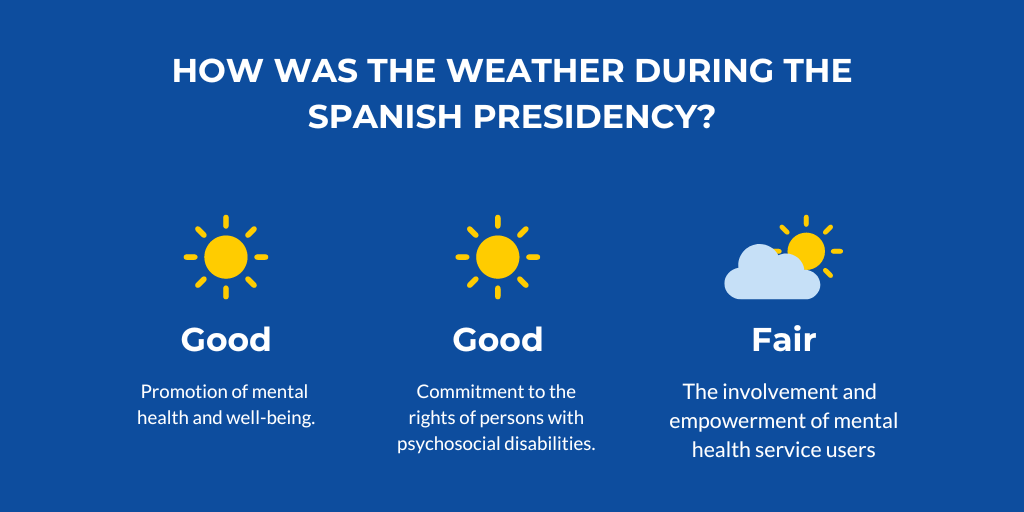Scorecard – The verdict on the Spanish presidency’s work on mental health and human rights

Mental Health Europe has analysed the work of the Spanish Presidency of the Council of the EU and awarded a score for three key areas:
- Promotion of mental health and well-being. Spain’s score: Good
- Commitment to the rights of persons with psychosocial disabilities. Spain’s score: Good
- The involvement and empowerment of mental health service users Spain’s Score: Fair
The year 2023 has been particularly remarkable for mental health at European level. The Spanish Presidency has set a great example for future Presidencies and laid the groundwork to ensure mental health continues to be high on the EU agenda.
The Spanish presidency is congratulated on making mental health a multidisciplinary priority and for strong council conclusions on precarious work, young people and mental health.
Better engagement of experts by experience in the organisation and delivery of activities would have boosted Spain’s score even higher. A co-creation approach to ensure that experts by experience, supporters and all key actors are meaningfully involved throughout the process is the gold standard.
Mental Health Europe analyses the progress made by each presidency. Past analyses can be found here.
Introduction / Looking back – Expectations and Outcomes
Spain assumed the Presidency of the Council of the EU in the second half of 2023, and established four priorities for its mandate:
- To reindustrialise the EU and ensure its open strategic autonomy
- Advance in the green transition and the environmental adaptation
- Promoting greater social and economic justice
- Strengthening European unity.
Notably, the Spanish Presidency pledged to push for the extension of workers’ rights in several areas and for groups in vulnerable situations such as children, women suffering from violence, and people with disabilities.
Work towards a proper revision of the Multiannual Financial Framework 2021-2027 was also incorporated into the Presidency.

Promotion of mental health and well-being. Score: GOOD
Following the European Commission Communication on a comprehensive approach to mental health in June 2023, strengthening mental health was announced as a multidisciplinary priority for the Spanish Presidency. Four sets of conclusions were produced focusing on people doing precarious work, young people, and people that have both drug use disorders and mental health problems. These conclusions set out to prioritise mental health and wellbeing across the European Union, with a particular focus on the most urgent matters and the most vulnerable groups.
On 9 October, the Council approved the first-ever set of conclusions on the interconnection between mental health and employment, with a focus on precarious work. These conclusions invited member states, among other things, to:
- Promote quality employment policies to combat precariousness.
- Strengthen public systems that safeguard mental health at work.
- Support the recruitment or reintegration of workers with mental health problems.
The Council also invited the European Commission to:
- Reflect on an adequate policy for addressing psychosocial risks at work.
- Consider the right to disconnect as a prevention measure.
- Foster coordination of national initiatives on the management of psychosocial risks at work.
On November 14 a High-Level Meeting on Mental Health was organised with the aim to facilitate the exchange at EU level and to support the development of policies, good practices and projects on mental health, and the implementation of the ‘Healthier together. EU non-communicable diseases 2022-2027’ and the European Commission’s recent communication.
On 23 November, youth ministers approved conclusions on a comprehensive approach to the mental health of young people in the European Union. The conclusions highlighted the need for preventive measures on mental wellbeing for young people. The focus was on the need to grant young people access to mental health care services and to take measures to increase awareness and break the stigma.
On 30 November, the Council of the European Union approved general conclusions on mental health. Building on the Commission’s communication on a comprehensive approach to mental health, the conclusions encouraged the member states and the Commission to continue moving towards a comprehensive approach to mental health maintaining this subject in the international agenda. The Council invited member states to elaborate actions plans or strategies with a cross-sectoral approach to mental health, addressing not only health, but also employment, education, digitalisation and AI, culture, environment, and climate factors, among other things. Lastly, the conclusions encouraged initiatives to support mental health and communication campaigns in the EU through a European year of mental health, which should take place no later than 2029.
On 4 December, the Council approved Conclusions on people having drug use disorders that co-occur with other mental health disorders. The Conclusions built on the recognition – as indicated in the Commission communication on a comprehensive approach to mental health- that the special care needs of people with comorbidities should be addressed to facilitate access to effective treatments, in particular for people with drug-use disorders.

Commitment to the rights of persons with psychosocial disabilities (GOOD)
Although not all the Council Conclusions made direct reference to the UN Convention on the Rights of Persons with Disabilities (UN CRPD) the work of the Spanish Presidency aligned with the psychosocial approach to mental health. Mental Health Europe praises the consistent recognition that the right to health includes the right to mental health.
An informal ministerial meeting with European health ministers took place on the 28 July with a focus on improving health in the EU. The meeting aimed to make further progress in the integration of mental health in all policies, in access to healthcare for people with mental health problems – especially the most vulnerable groups, and in the development of support tools to deal with critical situations.
In Toledo, between September 26 – 27 the Spanish Presidency organised a Conference on health and safety at work. The Presidency also engaged in European Week for Safety and Health at Work in October.

The involvement and support of empowerment of mental health service users (FAIR)
In the Council Conclusions prepared by the Spanish Presidency, the involvement and support of empowerment of mental health service users was underscored. For example, in the Council Conclusions on mental health, recommendations were directed to the European Commission and the Member States to recognise and promote the active participation of people with lived experience and integrate existing and new knowledge into multidisciplinary training, mental health reforms, research and policy development. Similarly, the Conclusions on youth mental health called for the European Commission and member states to promote the active participation of young people and referred to the need for young people to be aware of the importance of their involvement in ensuring the effectiveness and relevance of the measures to be adopted, using, for instance, youth-friendly and accessible communication.
Nevertheless, it is not clear to what extent users of mental health services and expert by experience were engaged during the Spanish Presidency. We recommend that for future Presidencies and activities of the Council, these efforts and commitments will not only be limited to the possibility to speak at events but also to the overall organisation and delivery of activities. This could take the form of a full co-creation approach to ensure that experts by experience, supporters and all key actors are meaningfully involved throughout the process.
Conclusions
The year 2023 has been particularly remarkable for mental health at European level. The Spanish Presidency has set a great example for future Presidencies and laid the groundwork to ensure mental health continues to be high on the EU agenda. This is important considering the upcoming European elections are an ample opportunity to ensure that politicians are elected that will hold stead-fast in their commitment and investment in mental health through long-term action. Mental Health Europe commends the attention dedicated by the Spanish Presidency to towards mental health and actively promoting workers’ psychological well-being, as well as mental health support for vulnerable groups. Many elements Mental Health Europe has been advocating for have been considered by the Council in the conclusions on mental health.
Stay connected
Get our latest news, personal stories, research articles, and job opportunities.